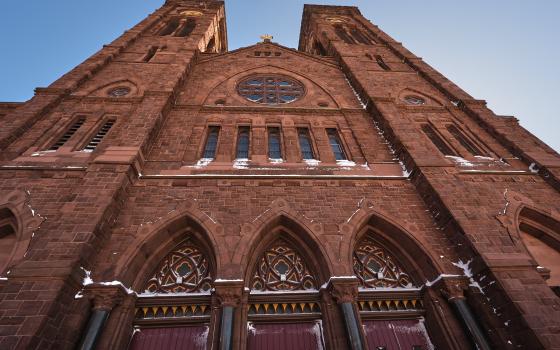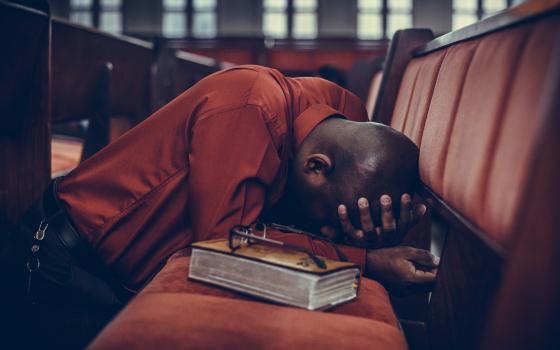American poet Amanda Gorman reads her poem "The Hill We Climb" during Joe Biden's presidential inauguration at the U.S. Capitol in Washington, D.C., Jan. 20, 2021. Gorman said she wrote her latest poem, "New Day's Lyric," "to celebrate the new year and honor both the hurt and the humanity of the last one." (CNS photo/Reuters pool/Patrick Semansky)
We are beginning the celebration of Black History month. Our campus inclusion team asked us to write about an influential person from Black history to celebrate. I immediately thought of Frederick Douglass, who wrote about learning to read. What he wrote in his autobiography reinforced my commitment to teach others to read, something I have done for the past 60 years.
As a young child, Douglass (1818-1895) overheard his enslaver chastise his own wife for teaching Douglass to read. He sternly scolded her: "It is unlawful and unsafe to teach a slave to read … it will forever unfit him to be a slave." The young boy overheard those words. "From that moment, I understood the pathway from slavery to freedom. I set out with high hope and a fixed purpose, at whatever cost of trouble, to learn how to read," Douglass wrote
Learning to read and write enabled Douglass to escape slavery and become an effective abolitionist. He was a powerful voice for human rights for all people, including women — a radical idea in his day.
Douglass learned to read beyond the printed page. He "read" the faces of people he met, the moods both dangerous and inviting, the signs of the changing times. He spoke out fearlessly for truth and freedom on behalf of all people. He used his gifts both wisely and well.
So must we.
Advertisement
Other Black writers, gifted with words of wisdom, continue to inspire me. A longtime favorite is the poet, Langston Hughes (1901-1967). "Hold fast to dreams," he wrote in the well-known poem "Dream,": "For if dreams die/ Life is a broken-winged bird/ That cannot fly."
I love everything about this poem: the sound, the rhythm the images, the message to hang on to our dreams, to keep hold of hope — always and forever.
Maya Angelou's poetry likewise births hope. Her 1993 poem "On the Pulse of Morning," contains one stanza after another filled with wisdom and hope. "Lift up your eyes upon/ This day breaking for you," she wrote. "Give birth again/ To the dream."
A contemporary poet, Amanda Gorman, is an "old soul" in her words and spirit. Like Hughes and Angelou, Gorman holds out hope for better days in a new poem called, "This Hope Is Our Door, Our Portal." Gorman's keen mind captures the grief and pain of the COVID-19 pandemic. Her sharp ear hearkens back to a line in Auld Lang Syne, "Come, look up with kindness yet/ for even solace can be sourced from sorrow."
In the last stanza of her new poem, Gorman proclaims: "Be bold sang Time this year,/
Be bold, sang Time,/ For when you honor yesterday,/ Tomorrow ye will find." She concludes with an invitation: "Come over, join this day just begun./ For wherever we come together,/ We will forever overcome."
Gorman's poem holds timeless images, rhythms, and words ancient and new. She holds out hope that some way, someday, we can come together, overcoming all that divides.
These Black writers inspire and encourage us, and yet there is more to say about our celebration of Black History Month. As their words hold out hope for a more just and kind nation, the reality of day-to-day life for people of color, especially Black Americans, is far from fair or just.
Over the 60-plus years that I have been driving a car, I have been stopped by the police for minor traffic violations several times. I have never received a ticket. I have received warnings to come to a full stop, to adhere to the posted speed limit, to be more attentive to the signs about making turns. I have never had a moving violation. Once I thought it was luck, or my excellent driving skills; then I began to wonder: Was it because I was white?
While eating in a restaurant in a white neighborhood, I expect to be seated and greeted in the order in which I arrive. That didn't happen when I was with a Black man. We waited a long time to be seated, then for the server to come to our table. Many who arrived after us were served first. My companion's soup was served cold; mine was not. Was the server just having a bad day, or was she sending a message that he was unwanted in this territory? On another occasion, I noticed that whenever I walked into a big box store in a white neighborhood, an announcement would come over the loudspeaker if a Black friend was with me. I wondered what the enigmatic message was. My Black friend explained to me that this was code for: "Suspicious person at the door."
What do these experiences do to the spirit of a Black person? I am not eager to get ticketed for traffic violations, nor I do not want to be treated with hostility or rudeness. But I long for the day when all people are treated with courtesy, dignity, fairness and justice. Let us all work together to make Martin Luther King Jr.'s dream and the promise of this nation come true. We all are equal and deserving of respect.





